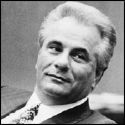The Second Burial of John Gotti
The legendary mafia don hasn’t been gone very long -- but his old neighborhood is already
changing, and forgetting him.
 gcp224@nyu.edu
gcp224@nyu.edu
Four girls in black ponytails and Sunday dresses are laughing and chatting in Spanish as they walk toward Nativity
of the Blessed Virgin Mary, the orange brick church that towers over Ozone Park, Queens. They cross a famous intersection.
Do they know it was here, 15 years ago, that mob henchmen gunned down Thomas and Rosemarie Uva, the daredevil couple who made
a career of robbing Italian mafia social clubs? It seemed unlikely. Nowadays, Indian pop music blares from cars more often
than gunshots, and West Indian grocery stores line the streets near the ex-headquarters of this neighborhood’s most
famous denizen: late mafia boss John Gotti.
The notorious Gambino crime family honcho ran his affairs here, from behind
two bright red metal doors of the Bergin Hunt and Fish Club. He died in prison in 2002. Now, new immigrants are moving in,
the Italians are leaving and the neighborhood seems to be forgetting him.
“This whole place was Italian-American.
But they just started moving,” said Angelique Kayani, 69, who was born in Panama and moved to Ozone Park from nearby
Richmond Hill in 2006. “As a matter of fact, the house over, they moved away on Sunday. And a lot of Indians moved in.”
Kayani says she doesn’t know much more about Gotti than what she’s read in the papers. This is a quiet place where
neighbors look out for one another, and children play on their scooters in the street, she said.
Down the block, a woman
in a bright pink sari tended to her garden.
“I don’t speak English,” she smiled, apologetically. “I
speak Bengali.”
“John Gotti? No, I don’t know him,” said Luis Rivera, who emigrated from Mexico.
Rivera said his Liberty Avenue block is mostly Indian.
That an aura of omertá seems to prevail, even among
the old-timers, and even now, only seems to hasten the forgetting. Hardly anyone talks about the 20-plus years of extravagant
July 4th block parties Gotti used to throw for the neighborhood, complete with Boar’s Head burgers, ice cream cones,
and illegal firework displays. (In 1995, then-mayor Rudolph Giuliani, who made his prosecutorial reputation by cracking down
on wiseguys, banned these bashes.)
“Oh, no, I don’t speak English. I only speak Italian,” said a gray-haired
woman who was rocking in a chair in the front yard of her 97th Street home, beside a tomato plant and a statue of the Virgin
Mary. “But talk to them,” she said, gesturing toward her Hispanic neighbors across the street. “They’ll
talk to you.”
Larry Varano, 74, an Italian-American who has lived in Ozone Park for 50 years, admits to remembering
the Gotti days. Gotti’s brother Frank once lived up the block (though the Dapper Don himself only worked here —
he lived in nearby Howard Beach). “They were nice people,” he said. “What they did in their private life,
I don’t know. I don’t care.”
He said the neighborhood had changed a lot in recent years.
“When
I first came out here — let’s put it this way. The block I lived on was 99 percent Italian. Now it’s 4 percent
Italian,” Varano said. He explained that most of his current neighbors are Puerto Rican. “They’re nice,”
he added. “In fact, the neighbor I have now is Puerto Rican, and he’s the best neighbor I’ve had.”
Developers
carved Ozone Park out of farmland in the 1880s, when the Long Island Railroad began service through the area. Italian-Americans
were early settlers. The neighborhood mostly consists of one and two family homes, with some condos and small apartment buildings,
said Betty Braton, chairwoman of Queens Community Board 10. The 2000 U.S.Census lists 43% of residents
as white, 40% as Hispanic or Latino and 14% as Asian.
Buried in an overgrown junk-strewn lot, behind the house where
Christopher Tirado, 22, lives with his brother and nephews, are the bones of the mafia’s past. Police excavations here
in 2004 uncovered two pelvic bones, a set of teeth, skull fragments, and shoes full of skeletal remains, later confirmed as
belonging to Bonnano family capos Philip “Phil Lucky” Giaccone and Dominick “Big Trin” Trinchera.
Also believed to be buried here are hit man Tommy DeSimone, portrayed by Joe Pesci in the movie “Goodfellas,”
and John Favara, a Queens man who accidentally struck and killed Gotti’s son with his car, then disappeared months later
while the Gottis were vacationing in Florida.
“I don’t know pretty much, other than they were digging our
backyard,” Tirado said.
“I haven’t heard about it,” said Leon Kennedy, 67, who recently moved
into a house close by.
This is the seedier part of town: some nearby homes are vacant, the windows boarded shut. Broken-down
cars and piles of junk lay scattered in the weeds. “No dumping” and rodent bait warning signs hang on the fence.
Even
Gotti’s old block has changed. Down the street from his former headquarters, the Sunrise Chinese Restaurant, El Viejo
Yayo Restaurant, and Tiffany’s West Indian Deli have moved in. The Bergin Hunt and Fish Club is gone, the storefront
has been taken over by a pet-grooming salon.
Varano plans to rent a car and travel Europe, starting in Rome. Will he
be leaving Ozone Park too? “Yeah,” he said, “When I die.”

